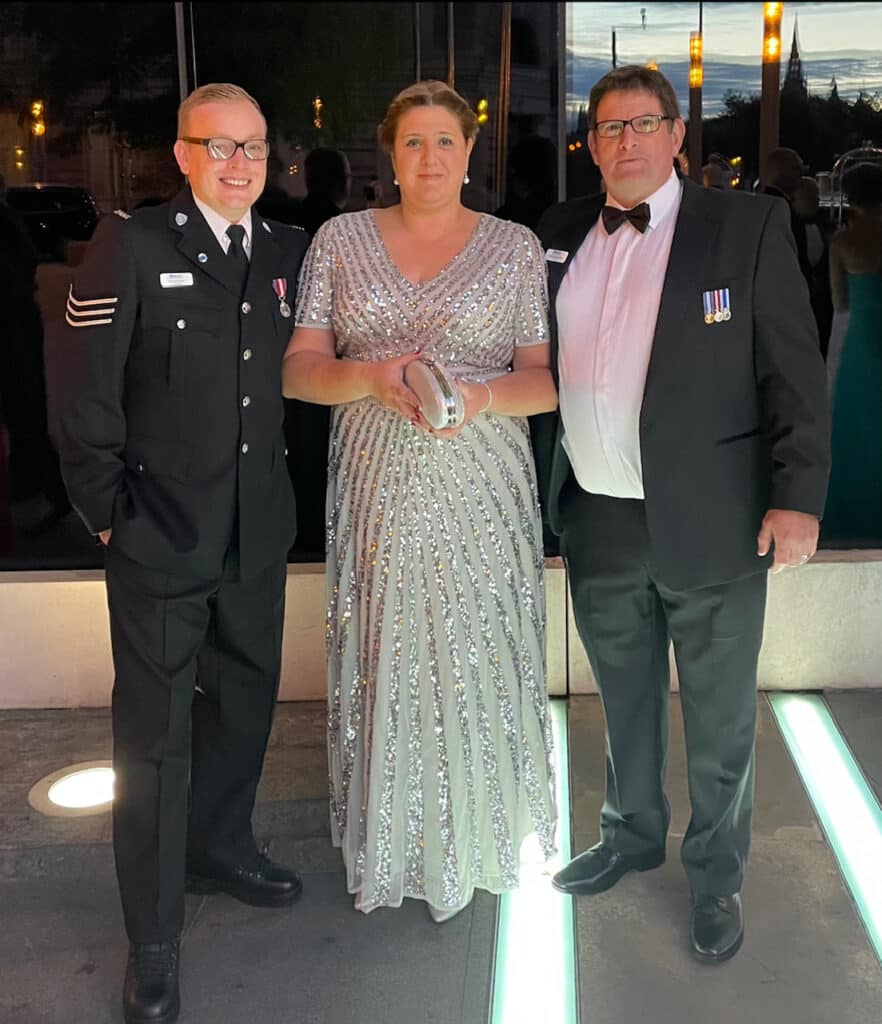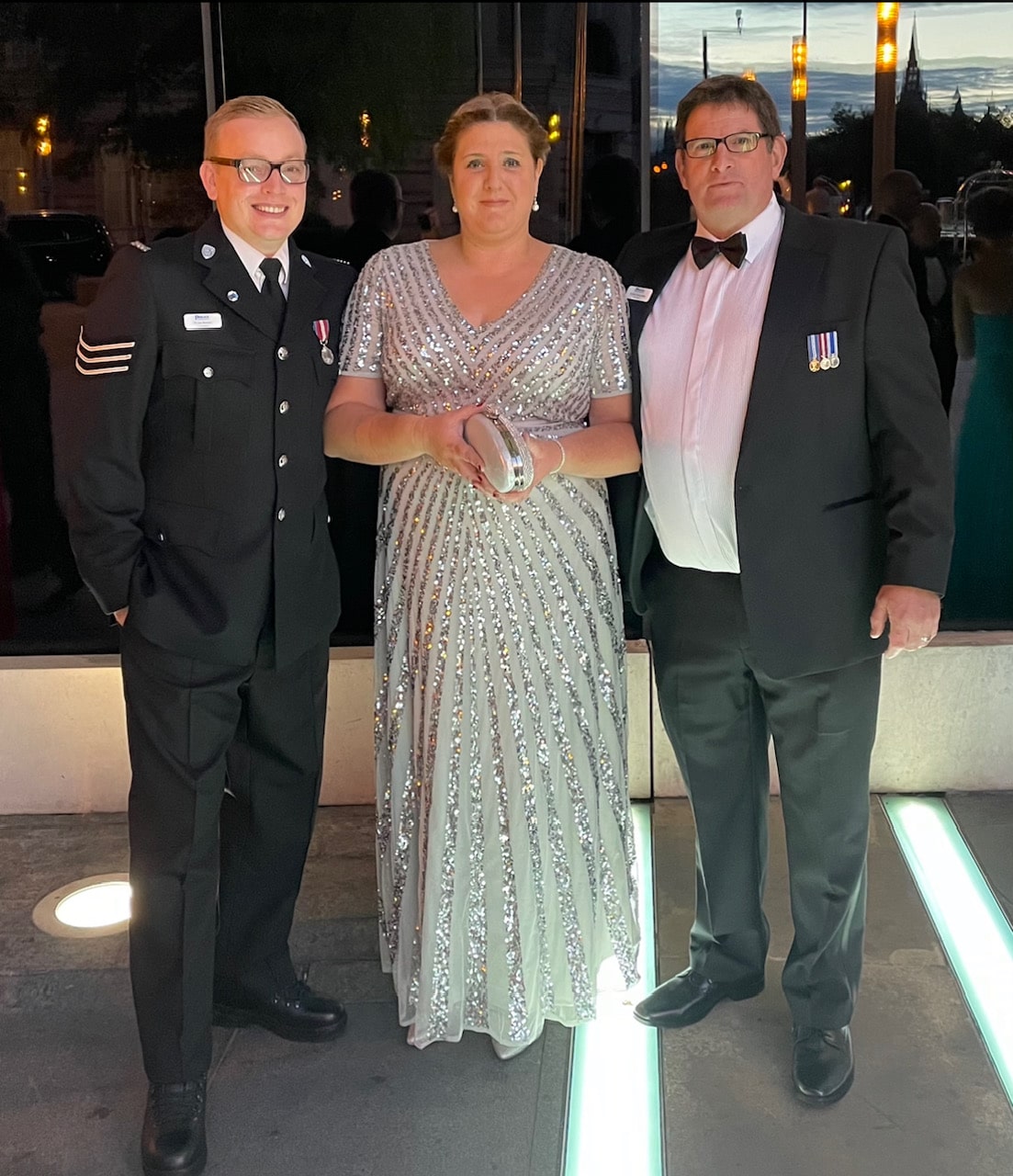
Liz Groom with the Cambridgeshire nominees for the 2020 Police Bravery Awards Nick Ashton-Jones (right) and Dan Bramley.
Marking International Women’s Day, Liz Groom, the first female chair of Cambridgeshire Police Federation, has described policing as a “wonderful career for women” and encouraged more to join the service.
“I would say to any woman considering joining the police today please do, it’s a wonderful career,” said Liz, “I have met some amazing people and made friendships for life. It’s not easy, it’s harder now than ever before for new joiners, but there are real opportunities and having a family is not a barrier to progression.”
International Women’s Day is held on 8 March annually and celebrates the social, economic, cultural and political achievements of women. It also raises awareness about women’s equality and lobbies for gender parity. It has been marked since 1911 and this year’s theme is #BreakTheBias to address deliberate or unconscious bias which makes it difficult for women to move ahead – something Liz has experienced.
“When I joined the Roads Policing Department as a sergeant, I was the first female sergeant in the role for some 20 years. It was a battle to get there and then, after just four months, I fell pregnant with my daughter which was a huge, but wonderful surprise as I didn’t think I could have another child after trying for eight years!
“The reaction I had from the department, however, was one of disappointment rather than support. Not from my inspector, who was great, but from some of my peers. The room would “go quiet” when I walked in and it actually made me think about whether I wanted to come back and work in this male dominated department that seemed to think I got ‘pregnant on purpose’.
“But I started working alongside the collision investigation team while I was on restricted duties and they restored my faith as they were a great bunch who made coming to work enjoyable.”
But Liz, who joined the Force in 1996 after deciding university wasn’t for her and replying to a job advert in her local newspaper, says the police service has changed since then.
“Policing today and how women are perceived has most definitely changed,” she explained, “After I joined we had intakes of just women and the recruitment of female officers has really increased and been improving over the years.
“Some recent intakes have been 50/50 male/female ratio so we are attracting more women into policing which helps with the perception that it’s a man’s role. We also have more women working in more specialised roles such as firearms and roads policing or dogs but still not enough so this area needs more work.
“I also think the increased fitness test is often a barrier as the figures do show that women struggle psychologically with it.”
“But one of the biggest changes for me is that having a family now doesn’t mean the end of your career. Part-time and flexible working make having a family and remaining at work so much easier.”
Liz then explained how a particularly supportive female inspector changed how she viewed her own career progression.
“After I had my son, over 19 years ago, I returned to work part-time and on a flexible shift pattern. My female inspector at the time asked if I had ever considered promotion as she thought I would suit the role of sergeant because I was a natural leader.
“I didn’t think it would even be entertained but she supported me and it prompted me to take the exam even though I started ‘acting up’ before passing it. It was hard work, studying for the exam in between work and having a very young baby and my husband was also a full-time police officer working shifts. But the encouragement and support she gave me pushed me through and I am glad she did as I love the rank of sergeant.”
But there was another test ahead for both Liz and the service when her son received a medical diagnosis. She explained: “My son was diagnosed as being on the autistic spectrum when he was just under three-years-old. This caused further challenges because mainstream childcare wasn’t ideal as he sometimes became aggressive to other children. I worked in custody then and my inspector in this role was particularly supportive around his needs and me attending courses to help us manage his behaviour at home.
“My husband, who is also in the job, was also allowed to work flexibly around my shifts as I returned to work full-time. Ironically, it was then him who faced some difficulty in career progression due to being a flexible worker as it wasn’t something many men did and his colleagues and managers were not understanding.”
Liz also said she would encourage anyone to use the Federation as it’s meant to be used: “You can always approach the Federation for advice if you don’t feel happy with something. But I would say please don’t be afraid of challenging colleagues if you witness behaviour you are not comfortable with. Early conversations with colleagues and managers can stop issues from escalating and make work a happier place for everyone.
“We have a good balance of female Federation reps who are trained in most areas of equality and conduct and are, of course, approachable. Becoming a rep wasn’t something I always wanted to do but a sergeant colleague, who was a rep, encouraged me because I wasn’t afraid to speak up if something wasn’t right.
“I also never planned on becoming the branch chair but here I am – the first female chair of Cambridgeshire Police Federation and very pleased to be so. That in itself is a move in the right direction for women.”

Liz Groom with the Cambridgeshire nominees for the 2020 Police Bravery Awards Nick Ashton-Jones (right) and Dan Bramley.
